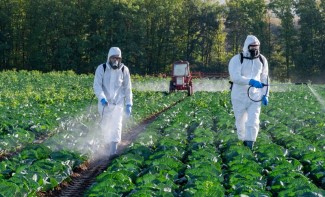
Pesticide use is a world-wide problem adversely affecting environmental health as well as human health. This Earth Day, take a step toward a healthier planet and a healthier you by limiting pesticides in your diet. Pesticides are used by farmers to kill “unwanted organisms” on plants. Unfortunately, they also kill many necessary microorganisms in the soil, gradually degrading the soil and depleting it of nutrients it needs to produce healthy plants.
Pesticides also create toxic runoff as they leach into groundwater and streams, affecting animal life as well as human drinking water. Pesticides have been linked to a variety of concerns in humans including nervous system disorders, carcinogenic (cancer causing) effects, hormone system problems, and skin, eye and lung irritation.
Children are especially sensitive to pesticide exposure. When you buy organic products, you not only ensure that the food you eat and feed your family is free of harmful chemicals, you also support those farmers who are working hard to grow food in an environmentally conscious way. Down to Earth has a huge selection of organic produce, convenience foods, and body care products to fit your needs. Take these simple steps to avoid pesticides in your food:
- Buy local, organic produce whenever possible.
- When buying packaged products, look for those that contain organic ingredients—the more organic, the better.
- Don’t limit your organic products to food alone – look for organic varieties of body care products and clothing as well.
Certain products may not be available organic, or they may be expensive. Luckily, the Environmental Working Group has compiled a list of foods with the highest levels of pesticide contamination as well those with the least. This list is a handy guide in determining which products are most important to buy organic versus those that may be safe to buy conventionally grown. Below is the full list with the “Dirty Dozen” at the top and the “Clean Fifteen” at the bottom:
| Rank | Fruit or Veggie | Score |
|---|---|---|
| 1 (worst) | Peach | 100 (highest pesticide load) |
| 2 | Apple | 93 |
| 3 | Sweet Bell Pepper | 83 |
| 4 | Celery | 82 |
| 5 | Nectarine | 81 |
| 6 | Strawberries | 80 |
| 7 | Cherries | 73 |
| 8 | Kale | 69 |
| 9 | Lettuce | 67 |
| 10 | Grapes - Imported | 66 |
| 11 | Carrot | 63 |
| 12 | Pear | 63 |
| 13 | Collard Greens | 60 |
| 14 | Spinach | 58 |
| 15 | Potato | 56 |
| 16 | Green Beans | 53 |
| 17 | Summer Squash | 53 |
| 18 | Pepper | 51 |
| 19 | Cucumber | 50 |
| 20 | Raspberries | 46 |
| 21 | Grapes - Domestic | 44 |
| 22 | Plum | 44 |
| 23 | Orange | 44 |
| 24 | Cauliflower | 39 |
| 25 | Tangerine | 37 |
| 26 | Mushrooms | 36 |
| 27 | Banana | 34 |
| 28 | Winter Squash | 34 |
| 29 | Cantaloupe | 33 |
| 30 | Cranberries | 33 |
| 31 | Honeydew Melon | 30 |
| 32 | Grapefruit | 29 |
| 33 | Sweet Potato | 29 |
| 34 | Tomato | 29 |
| 35 | Broccoli | 28 |
| 36 | Watermelon | 26 |
| 37 | Papaya | 20 |
| 38 | Eggplant | 20 |
| 39 | Cabbage | 17 |
| 40 | Kiwi | 13 |
| 41 | Sweet Peas - Frozen | 10 |
| 42 | Asparagus | 10 |
| 43 | Mango | 9 |
| 44 | Pineapple | 7 |
| 45 | Sweet Corn - Frozen | 2 |
| 46 | Avocado | 1 |
| 47 (best) | Onion | 1 (lowest pesticide load) |
Note: There were a total of 47 different fruits and vegetables ranked but grapes are listed twice because they looked at both domestic and imported samples.
Sources: